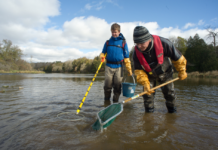As the world’s population continues to age, the number of people living with dementia is on the rise. It is a trend that has many people worried, but there is hope with innovative programs that push the boundaries of what is possible, offering new therapies, cutting-edge technologies, and approaches that are changing lives for the better. The Dementia Resources for Eating, Activity, and Meaningful Inclusion (DREAM) project is a cross-Canada research team, composed of researchers at the University of Waterloo alongside the University of Northern British Columbia (UNBC), bridging gaps in learning when it comes to dementia.
This project brings together 40 people and 15 organizations ranging from researchers, community establishments, and organizations such as the Alzheimer Society of Ontario, Alzheimer Society of British Columbia, and the YMCA of Three Rivers. This collaboration not only benefits the goals and ideologies of the community but influences other ongoing efforts to tackle dementia by providing inspiration and foundations.
The team has developed a new series of learning modules and resources that touch upon the diverse changes with dementia, the rights of people living with dementia to support their health and well-being, the benefits of physical activity and healthy eating, and dementia-inclusive approaches to communication, program planning and delivery, as well as facility design.
DREAM strives to create more community support for people with dementia and their families, including primary caregivers and community workers. This new concept brings about innovative and strategic ways to train staff, volunteers, and social workers so that they can deliver these programs in the most efficient way.
Marria Khalid is a fourth-year UW biomedical science student and co-president of Brain Exercise Initiative (BEI), a club that works with local retirement homes and Alzheimer’s patients through the methods researched by the Japanese neuroscientist Ryuta Kawashima. She strongly acknowledges the need for such initiatives and hopes to spark a change in her community.
“What the DREAM project strives to achieve is amazing. This program will increase the number of services and wellness programs that persons with dementia and their caregivers can access,” Khalid said.
Researchers with the project take this new approach by aiming to improve how community service providers support and include persons living with dementia in their wellness programs and services, especially those related to physical activity and healthy eating. The researchers also made the resources available in multiple languages on their new website.
Laura Middleton, an associate professor and researcher at the school of public health sciences of UW, is also leading the project. Middleton specializes in physical activity during aging and social inclusion of dementia. She says that the DREAM approach provides resources for care providers and teaches them how to adapt to the needs of people with dementia.
“Our learning modules and resources aim to give community service providers, such as exercise instructors, dieticians and those who provide cultural, religious or other community programming, the ability to adapt their current programs to be more inclusive of people living with dementia,” Middleton said.
This helps not only to overcome the stigma around dementia but tackles the stigma with a catered approach in terms of diversity and inclusion. Their resources consist of booklets, pamphlets and videos which aim to tackle different elements.
She also touched upon the social benefits of such an approach: “people living with dementia receive encouragement and support from program leaders and fellow participants.”
Her personal experience with a relative with dementia was one of the reasons that motivated her decision to pursue this field. She firmly believes that by reconciling differences and sharing aims, the end output can impact the community immediately.
“We have created training modules that can be shared with people with dementia. People living with dementia are benefiting,” Middleton said.
This is heavily embodied in their research trajectory because the training modules were published immediately. Despite obstacles like the COVID-19 pandemic, her team persevered.
“We had plans to go into communities but had to be virtual, our core group was great but COVID-19 was the biggest challenge. However with a big group of people we accomplished it,” Middleton said.
Another integral part of the team, Shannon Freeman, who graduated from the faculty of health at UW , is leading the project from UNBC. She mentioned how they’re working to ensure that service providers understand dementia and how to support those with dementia.
“Our resources de-stigmatize dementia and teach people how small changes can support inclusion,” Freeman said.
With reference to the project, there are also many other ongoing efforts to create change within the community including initiatives led by student groups. Co-presidents Hawa Patel and Marria Khalid strive to make change through BEI.
“As with the DREAM Project and many other programs, the BEI is trying to raise awareness. We have started a new series called Mind Matters, this includes interviewing experts in the field to gain a greater understanding on Alzheimer’s; the series was kicked off with Dr. Allen Power, a geriatrician who works for the Aging and Dementia and Innovation for Schlegel-UW Research. He discusses innovative approaches to aiding persons living with dementia that can be applied to enhance many of the programs out there. This new series can be found on their Instagram page,” Khalid said.
One of their community partners, YMCA of Three Rivers, sees the important impact of yielding from the DREAM project. Crystal Hughes, the wellness director at the YMCA, mentioned how the modules will be useful to her team.
“The DREAM learning modules and resources will help our staff understand and support the needs of people living with dementia,” Hughes said.
With success on their way, this project is already making highlights, and with more establishments and organizations interested to partner up and share the success, this team is ready to make a stronger and everlasting difference in the community one step at a time.
“Anyone reading this article may know or will know someone with dementia, I would say that it’s always a difficult journey but there are ways to support someone that is living with dementia. Start with hope and a positive mindset,” Middleton said.





























